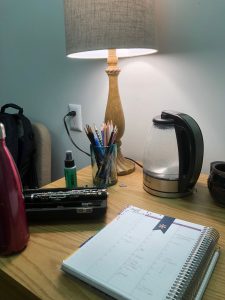Yesterday, I found myself having a very familiar conversation with a young student who has a playing test in her band class today. She was nearly hysterical about the prospect of playing two scales and one song they’ve been working on for her band director, to the point that she could barely catch her breath and play those two scales for me—scales we’ve worked on diligently for months, scales that she knows very well. Her tone wavered, her tongue grew heavy, and after a few minutes she just sighed, clearly in despair over the whole thing.
I’m not without sympathy for this student, nor for others like her. I can remember bearing the weight of nerves myself, from shaking hands and shaking lips to dry mouth and breathing that bordered on hyperventilation. To this day, these feelings come and go, although I am much less susceptible to them as years go on and there are fewer completely unfamiliar performance situations for me.
In my quest to master the physical symptoms of nervousness, I did finally find some techniques that helped, after trying to just not feel nervous, which, of course, does not work! With time, with age, with confidence, I began to understand that no one, literally no one, is ever paying attention to us with the level of care and detail that we devote to the attention we pay ourselves, and that helped, too.
Tips for Nerves of Steel
#1: You can’t not be nervous. Accept what you feel, and feel it fully. Then find a way to walk through it, despite the fact that you feel it. Eva Amsler, flute professor at Florida State University, is a dear friend and mentor to me, and she is the one who helped me to understand this fact—you must feel what you feel. Just don’t let it stop you.
#2: The battle you are fighting is with yourself. My sweet high school freshman from yesterday afternoon was just sure that the issue she was having was related to the assignment itself. She’d only found out about it on Thursday of last week. They’d never asked for two-octave scales for a grade (despite the fact that they are on permanent assignment from me!) Finally, she muttered, “The new director just wants me to fail. He’s gotta be thinking, ‘Here she comes! She’ll just screw it up again!’”
I looked her straight in the eye, and told her two things: the director is most certainly NOT wanting her to fail. He’s waiting for the day she comes in and knocks his socks off. He wants her to succeed, to be strong, to be able to show him what her practice has garnered in terms of her skill level. The fight she’s got to fight is not with him, but with herself. For every piece of negative information she chooses to believe about herself, her fight will be that much harder. This goes for all of us. We must fight our own self-image issues, societal habits of downplaying our own talents and hard work, and our own expectations of failure. What would happen, if instead of failure, we learned to expect success?
 #3: Practicing visualization of a desired outcome is as important as practicing the music itself. In the middle of undergrad, when I was beginning to see some success in terms of ensemble placements, gigs on tap, and competitions, perversely, I began to have more issues with nervousness around performing. In those days, I learned to go away by myself into a practice room, rather than staying backstage with everyone else. I would sit, regulate my breathing, and imagine exactly how I’d like to begin each piece. I took it down to microscopic levels. How should I breathe to properly execute the first phrase? What would the appropriate articulation feel and sound like? How would I like to bring direction and expression to that phrase? I imagined all of those things before I tried to do them out loud, and having a strong plan made it easier to remember what to do when I was faced with an audience. I still do that sort of visualization, even to this day.
#3: Practicing visualization of a desired outcome is as important as practicing the music itself. In the middle of undergrad, when I was beginning to see some success in terms of ensemble placements, gigs on tap, and competitions, perversely, I began to have more issues with nervousness around performing. In those days, I learned to go away by myself into a practice room, rather than staying backstage with everyone else. I would sit, regulate my breathing, and imagine exactly how I’d like to begin each piece. I took it down to microscopic levels. How should I breathe to properly execute the first phrase? What would the appropriate articulation feel and sound like? How would I like to bring direction and expression to that phrase? I imagined all of those things before I tried to do them out loud, and having a strong plan made it easier to remember what to do when I was faced with an audience. I still do that sort of visualization, even to this day.
#4: Practice performing. Rearrange your perception of how much time it’s going to take to be fully prepared for a performance or audition. At a certain point, earlier, probably, than you’d like, you must be through learning the music, and ready to practice performing it. Visualize yourself in the hall, in the darkness, with the kind of anticipatory quietness that takes over an audience before a concert begins. Put yourself in that headspace, and play your piece. Pay attention to where your focus breaks down, and try to determine why it happened. Do you need another breath? Are you forgetting to look ahead to a new line? Is there a subtle difference in the music that trips your eye and ear?
Throughout my journey with any piece of music, from the beginning I try to imagine what the performance will be like.
I try to view things objectively as I prepare—am I likely become fatigued during a dance movement of a symphony with its many repeats? Will my mind wander off during a repetitious passage?
If I can think of possible scenarios, I can work to guard against them.
When we think about adequate preparation and practice, we are often thinking about how to get everything in the right place at the right time, but being ready to perform is so very much more than that. Adequate preparation must include not just repetitions, but conscious, mindful repetition. Otherwise, we’re just killing time with a flute!
#5: The audience wants you to change their world. Whether you’re playing a jury for a panel of professors, a professional audition for a playing job, or your two-octave Ab scale for your high school band director, everyone is waiting, every time, to hear something that speaks to them of skill, of hard work, of humanity. They don’t want you to fall—they want you to soar.
It’s very easy to fall into the mindset that there’s an evil genius with a red pen waiting for you to miss a note, but truthfully, no one is paying attention at that level. And no one, NO ONE, is perfect. What I told my student and what I truthfully believe is this: do your best, every time. Prepare as much and as thoroughly as you can, especially your mental preparation. Strive to have a good time while you’re playing. You still won’t win every job, every competition or every A+, but you will stand a chance of being both a musician and a happy, functional person, and believe me—that is the goal!


Great article, Jessica, and should be required of students of all ages to read, and try.
Agreed!
[…] Flutist Jessica Dunnavant deals with performance nerves. […]